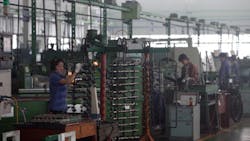Chinese Manufacturing Index Falls to 3-Year Low
BEIJING — Manufacturing activity in China contracted in January at its fastest pace in more than three years, according to government data released Monday, underlining weakness in the world’s second-largest economy.
The official Purchasing Managers’ Index (PMI), which tracks activity in factories and workshops, fell to 49.4, figures from the National Bureau of Statistics (NBS) showed. It was the lowest figure since 49.2 in August 2012, and was below the median forecast of 49.6 in a Bloomberg survey of economists.
Chinese shares closed down as the weak figures weighed on sentiment, with the benchmark Shanghai Composite Index falling 1.78% and the Shenzhen Composite Index, which tracks stocks on the country’s second exchange, retreating 1.04%.
The manufacturing slowdown “points to weaker growth momentum,” said Yao Zhang, China economist at Nomura Holdings in Hong Kong. “We believe economic growth may start to lose steam again, after stabilizing a little.”
It was the sixth consecutive month that the official index showed contraction, which Bloomberg said was the longest such series on record.
“The manufacturing sector will likely face a tough year ahead on the back of overcapacity, weakening global demand, and government’s plans to tackle pollution,” ANZ economists Liu Ligang and Louis Lam said in a report.
China’s economy, which is a vital driver of global expansion, grew 6.9% last year, its weakest rate in a quarter of a century.
China’s leaders — who targeted growth of “about 7%” — are looking to transform the economy away from the investment and exports of the past to one more oriented toward domestic consumer demand, but the transition is proving bumpy, and the growth slowdown has alarmed investors worldwide.
Manufacturing Doldrums
The private Caixin Purchasing Managers’ Index, which has a greater emphasis on smaller firms, came in at 48.4 for January, slightly up from 48.2 in December, the Chinese financial magazine said in a joint statement issued with data compiler Markit.
Liu Dongliang, an analyst with China Merchants Bank (CMB), said as the official PMI covers more big companies, it showed that “the manufacturing doldrums spread from small- and medium-sized firms to larger ones.”
With excess manufacturing overcapacity and a sluggish property market, authorities are pushing for so-called “supply side reforms” that focus on reducing stockpiles and debt.
“The domestic economy is yet to show signs of a bottoming out while the capacity reduction moves may add more turbulence to economic indicators,” CMB’s Liu said.
In the official survey, the new orders sub-index fell to 49.5 from 50.2 in December, “suggesting falling demand in the manufacturing market,” while that for employment remained in contraction territory at 47.8.
Analysts expect the government to further loosen its monetary policy by cutting the amount of cash that banks must keep in reserve or even the interest rate to boost growth.
“Refraining from further easing could risk an even weaker economy, which will then intensify depreciation expectation and capital outflows,” ANZ’s Liu and Lam said.
Around $1.0 trillion left China last year, according to Bloomberg Intelligence. In December alone, capital outflow from the country was nearly $160 billion, reflecting growing concern about the economy against a backdrop of volatility in the foreign exchange and stock markets.
Copyright Agence France-Presse, 2016
About the Author
Agence France-Presse
Copyright Agence France-Presse, 2002-2025. AFP text, photos, graphics and logos shall not be reproduced, published, broadcast, rewritten for broadcast or publication or redistributed directly or indirectly in any medium. AFP shall not be held liable for any delays, inaccuracies, errors or omissions in any AFP content, or for any actions taken in consequence.
